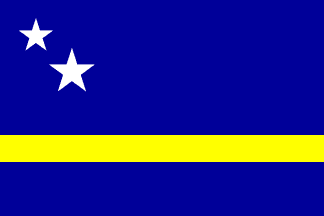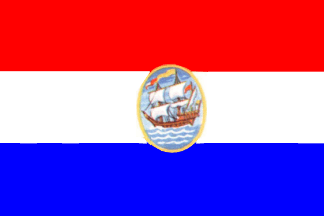 (2:3)
image by Zoltan Horvath, 15 May 2024
(2:3)
image by Zoltan Horvath, 15 May 2024
Last modified: 2025-08-09 by rob raeside
Keywords: antilles | curaçao | curacao | yacht club | netherlands antilles |
Links: FOTW homepage |
search |
disclaimer and copyright |
write us |
mirrors
 (2:3)
image by Zoltan Horvath, 15 May 2024
(2:3)
image by Zoltan Horvath, 15 May 2024
Official Name: Country of
Curaçao, Land Curaçao
Capital: Willemstad
Flag adopted: 2 July 1984
See also:
Ratio: 2:3. Adopted: 2 July 1984.
Mark Sensen
A blue flag with a yellow stripe (about the width of the white
stripe in the Danish flag), located below
the center line, and containing two 5 pointed white stars in
upper hoist, the upper one smaller and to the left of the lower
one.
William M. Grimes-Wyatt, 8 April 1996
From www.curacao-tourism.com (defunct):
"Curaçao’s flag portrays the blue sea and sky,
bisected by the yellow sun. The two stars represent Curaçao and
its uninhabited sister island Klein Curaçao; their five points
symbolize the five continents from which the varied local
population originates".
Erki Kurrikoff, 5 Febuary 2002
According to Album 2000 [pay00]
- Curaçao - A blue flag of proportions 2:3 with a yellow stripe
in the lower part, propotions 5:1:2. At the upper hoist two white
stars. The diameter of the imaginary circle circumscribing the
first star equal to one sixth of the flag height, the centre
located at an imaginary vertical line one sixth of the flag
height from the hoist and an imaginary horizontal line one sixth
of the flag height from the top of the flag. The diameter of the
imaginary circle circumscribing the second star equal to two
nineth of the flag height, the centre located at an imaginary
vertical line one third of the flag height from the hoist and an
imaginary horizontal line one third of the flag height from the
top of the flag. The blue is Pantone 280, the yellow is Pantone
102.
Mark Sensen, 14 December 2003
There is an on-line document about national symbols of Curaçao including flag
specification sheet and colors:
https://gobiernu.cw/wp-content/uploads/2019/07/Buki_di_Bandera_A5_RAND__23_june_2.pdf
Zoltan Horvath, 15 May 2024
The Olympic Flag Manuals has no entry for Curaçao, as it is not a member of
the IOC.
The French Navy Books illustrates national flag and flag of
governor, but color specification is not given.
Vexilla Mundi gives official colors in
Pantone system: PMS 280C (blue), PMS 102C (yellow), and PMS White.
Wikipedia gives
official color values in Pantone system: PMS 280C (blue), PMS 102C (yellow), and
refers to publication above.
Flag Color Codes gives the following color values:
Blue: Hex. # 002B7F, RGB 0-43-127, CMYK 100-66-0-50, Pantone 2147 C, RAL
5002
White: Hex: # FFF FFF, RGB: 255-255-255, CMYK 0-0-0-0, Pantone N/A,
RAL N/A
Yellow: Hex. # F9E814, RGB 249-232-20, CMYK 0-7-92-2, Pantone 395
C, RAL 1026
Zoltan Horvath, 15 May 2024
 (2:3)
image by António Martins-Tuválkin, 10 November 2010
(2:3)
image by António Martins-Tuválkin, 10 November 2010
Acording to Emblemes et Pavillons, issue 5, February 1986, Curaçao has two
flags.
Their chronologie is:
1) 12 May 1981, comission star working in the selection of a flag;
2) Flag adopted 29 November 1982, like the current one but with the stars
rotated;
3) Modification 2 July 1984.
Jaume Ollé, 30 May 2010
I modified Mark Sensen's image to match this, assuming
that Jaume meant rotated 180 degrees, i.e., flipped vertically, i.e.,
standing on one tip, instead of on two. Due to the geometry of the flag,
this amounts almost exactly to say that the stars point to the upper
hoist.
António Martins-Tuválkin, 10 November 2010
 image by Jarig Bakker, 31 January 2003
image by Jarig Bakker, 31 January 2003
From "Vlaggenalbum" of Gouda's Roen (c. 1950) - The
flag for Curaçao is the Dutch flag with a
Coat of Arms in the center (apparently not the Coat of Arms of
that island); I haven't seen it in any flagbook, so this seems to
be highly doubtful. The ship is of the Netherlands
West India Company, see <www.ngw.nl>.
Jarig Bakker, 31 January 2003
Both Suriname and the Netherlands Antilles used the Coat of
Arms of the "Geoctrooiëerde Westindische Compagnie"
(Dutch West India Company), that is a three-master on a way sea.
So this Coat of Arms may have been used on flags. Note that the
old Coat of Arms at <www.ngw.nl>
has a white scroll with black lettering, and not a red scroll.
Jarig Bakker, 2 Febuary 2003
Last news I could stored is one seen 27 Sept. 2003 in which it
is said that Curaçao Parliament wants the "independent
status" whithin the Kingdom of the Netherlands, just like
"Aruba did in 1986 and Sint Maartin ". According to the
news <www.sinteur.com>
a referendum is planed to "next year", then sometime in
2003.
Juan Manuel Gabino Villascán, 26 October 2003
Indeed some (Curaçao and Sint Maarten) want a status aparte.
But there must be an agreement with the others islands and the
Dutch government first.
Mark Sensen, 27 October 2003
Minister Nicolai of Kingdomrelations reached a historic
agreement with Curaçao and Sint Maarten. The islands will become
separate countries, like Aruba. That means that the
co-operation between the Netherlands and the Netherlands
Antilles, as agreed by the "Koninkrijksstatuut" of
1954, will end. It is agreed that there will be a common court of
justice of the Netherlands, Curaçao and Sint Maarten. There are
also agreements on policing and prosecution. The Netherlands will
take care of the debts of the Netherlands Antilles, totalling 2,5
billion Euros. The Netherlands Antilles will cease to exist on 1
July 2007. Bonaire, Saba and Sint Eustatius will become Dutch
municipalities. Aruba is a separate entity since 1986.
No info about change of flags. The currency is also unclear,
although it seems that Aruba might be forced to enter the
Euro-zone(!)
Source: <www.nos.nl>
reported by Stefan Lambrechts.
Jarig Bakker, 3 November 2007
The Kingdom of the Netherlands is a UN member. The
islands Aruba and NA were (one) member of UPU and
observers of several other organizations (UNWTO
etc.).
The expectations is that this will be changed to Aruba,
Curaçao and Sint Maarten as one member/observer.
The Olympic Comittee has changed the rules for
membership of non-indepentent entities. Existing members will stay a normal
member, but new non-independent members will not be admitted. This means that
Aruba stays a IOC member, but
Curaçao and Sint Maarten athletes will have to be
part of the Netherlands team.
Maxim van Ooijen, 11 October 2010
The status of Curaçao and
Sint Maarten are the same now as that of
Aruba. Aruba has its own IOC delegation, I'm sure that Curaçao and
Sint Maarten will get everything Aruba has (IOC
delegation, ISO 3166 code, etc) in time, probably by the time of London 2012.
The
BES (Bonaire, St. Eustatius, Saba) islands is a different
kettle of fish - they are now considered integral parts of the
Netherlands, I would assume any
Olympic athletes from the
BES islands would march with the Netherlands team.
David Kendall, 11 October 2010
ISO has issued new country codes for islands in
the Dutch West Indies to reflect their new administrative status following
constitutional reform by the government of the Netherlands.
The islands of Curaçao and Sint Maarten become autonomous
countries of the Kingdom of the Netherlands, with the
following two-letter and three-letter country codes issued under the ISO
standard, ISO 3166-1:
Sint Maarten (Dutch part) - SX SXM
Curaçao - CW CUW
The islands of Bonaire, Saint Eustatius and Saba become Dutch municipalities
which are assigned the following ISO 3166-1 code:
Bonaire, Saint Eustatius and Saba - BQ BES
The codes for the Netherlands Antilles are deleted from ISO 3166-1 and
transitionally reserved for a period of 50 years:
Netherlands Antilles - AN ANT
Source:
http://www.iso.org/iso/pressrelease.htm?refid=Ref1383 2010-12-20
Jarig Bakker, 29 December 2010
Football world governing body FIFA in its
official website has replaced the page "Netherlands
Antilles" for that of
"Curaçao"
In the link "Associations" of the same site in English, the name
"Netherlands Antilles" used to appear between "Netherlands" and "New
Caledonia"; right now it appears no more. Insted, the name "Curaçao" has
been placed between "Cuba" and "Cyprus".
A month ago, the International Olympic Committee
ruled that all athletes
from the former Netherlands Antilles would participate in the 2011 Pan
American Games and 2012 Olympic Games under the Olympic Flag as independent
Athletes; after that all of them shall compete under the Dutch flag. At the
same time IAAF (World Athletics Federation) witdrew its recognition towards
the non-existent Netherlands Antilles stating that Athletes from the former
territory shall compete for the Netherlands from now on.
Though lacking of official statements, it seems that FIFA decided to keep
recognition to Curaçao as the legal successor of the Netherlands Antilles.
The flag shown for Curaçao in the FIFA site is this
one, the code in use is : CUW (the same used by ISO-3166)
Juan Manuel Gabino Villascán, 6 March 2011
Invited to the Netherlands by Queen Beatrix, Abdullah Gül, President of the
Republic of Turkey, was welcomed on 17 April 2012 in an official ceremony
organized on the Dam, Amsterdam's main square. The municipal administration
decorated the place with the flags of the Netherlands, of Turkey, of of the
Dutch provinces and and of the Dutch overseas territories.Unfortunately, the
flag of Curaçao was hoisted upside down, as shown in a video footage available
on the website of the "AT5" news service.
Source:
http://www.at5.nl/artikelen/79562/gemeente-blundert-met-vlag-curacao
Ivan Sache, 24 April 2012
Fortunately the 2011 issues are somewhat flag-related as well: One of them is the series "Constitution - New Beginning" with eleven stamps with the theme of fish in the sea, where the design of the Curaçao flag appears on the portrayed fish. ...
Peter Hans van den Muijzenberg, 19 November 2010
Issued on 11 January 2011. (Apparently we need to be precise, if we
consider them flags on stamps at all, as it appears the country has a
new issue each month.)
Curaçao didn't join in with the dinghy series, and has not issued any
other flag-related stamps since the fish, as far as I can tell.
Peter Hans van den Muijzenberg, 08 May 2012